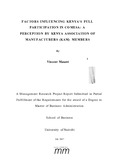| dc.description.abstract | Kenya's economic performance in the first decade after independence was impressive with
average GDP of 6.6% per year (Kenya Economic Survey, 2002). However, in the following
three decades, poor fiscal and monetary policy, external and internal shocks and political
events resulted in the worst economic performance in the short history of the country
(Encyclopaedia Britannica, 2007).
However, since 2002 there has been an upward trend in Kenya's economy. It is important,
,therefore, to state that trading with other countries (international trade) both within the region
and beyond plays a vital role in Kenya's economy (Central Bureau a/Statistics, Nairobi, 25th
May, 2006).
Over the years a number of countries in the world have been positioning themselves in the
global market through economic/regional integrations (Fatemi, 2000). Encouraged by the
success of the European Community (EC), many countries have banded together into
regional groupings, hoping that this will help improve their economic performance both as
individual countries and as a region (Keegan, 1984: 143).
Kenya is a member of a number of economic groupings in the region. These are the East
African Community (EAC), Common Market for Eastern & Southern Africa (COMESA),
Inter- Governmental Authority on Development (lGAD) among others.
But even though various studies shows that there are a lot of benefits for Kenya as a member
of a regional body like COMESA there are still hurdles facing member countries in
integrating into this regional body. The economic performance of COMESA countries has
been dismal averaging only 3.2 per cent a year since 1960 (Muuka et ai, 1998).
Various factors have been alluded to this poor performance. These are economic, political
and social among others.
This study has therefore focused to find out the factors influencing Kenya's full participation
in COMESA. | en |

